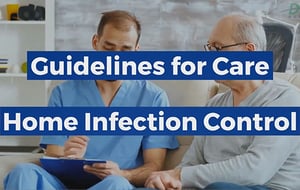
Care Home Infection Control Guidelines
Guidelines for infection control in the UK are outlined by the government. They must be adhered to in every health care setting, including care homes.
Take a look at our video below for an overview of how the guidelines can affect care home facilities.
Care Homes and HCAIs
In any healthcare setting a good reputation for the standard of care provided is vital. If a care home provides a high standard of care, the service users and their families will be reassured.
An essential element to achieving a high standard of care and a good reputation is to have infection control procedures firmly in place and consistently practised by all staff members.
There are many communicable HCAIs which can spread easily in care settings, often due to communal living arrangements. With this in mind, the ‘home comforts’ nature of residential care homes should never override the need for proper infection control – even if on the surface this may seem rather clinical.
For some people – especially the elderly and infirm in care homes – HCAIs can be very serious and even life-threatening, so it is critical that your care setting takes infection control seriously and forms vigorous habits for prevention.

Demonstrating The Quality of Your Care
All care settings must demonstrate the measures they have in place to meet the minimum requirements as set out in the Department of Health’s Health and Social Care Act 2008: code of practice on the prevention and control of infections.
As part of your care home’s commitment to the Health and Social Care Act, you must appoint a member of staff with authority to oversee infection prevention and control standards. Not only should this person provide guidance to the rest of your team, but they should play an active role in setting and monitoring the hygiene standards which will keep your residents safe.
With your infection prevention and control leader in place, regular staff training will ensure that all staff members are able to follow the appropriate guidelines. Care homes must be registered with the Quality Care Commission (CQC) who will monitor and rate the level of care provided. These scores will be published publicly, so anyone can access the information.
When the CQC inspects a care home they will assess whether it is safe. A care home is deemed safe if it is “kept clean and hygienic to prevent any risk of infection to you or other residents”[i], amongst other criteria.
If you don’t meet the required benchmarks, your care home could be rated as ‘requires improvement’ or even ‘inadequate’ – leading to severe reputational damage
Infection Control Equipment and Machinery
A fully stocked sluice room is an essential part of your infection control procedures. A comprehensive sluice room solution will enable your staff to dispose of potentially hazardous waste in a safe and effective manner.
Disposing of used medical pulp products quickly and efficiently will prevent the spread of infection from contaminated waste left hanging around. Using a medical pulp macerator avoids the use of clinical waste bin bags becoming overfilled and the potential of them splitting or spilling while waiting for disposal. If your facility uses reusable utensils you will need bedpan washer disinfectors which are designed to empty, wash and disinfect plastic or metal human waste containers. They will prevent your staff from having to empty and wash the reusable containers by hand.
Many care home residents may have more complex toileting needs, and your home may also need to provide and dispose of incontinence products. Tackling potentially embarrassing issues like incontinence quickly and effectively is important to maintaining high levels of care and the dignity of the care home resident involved. The most efficient and effective way to do so is to use an incontinence product macerator, which prevents soiled items lingering in the environment and causing unpleasant smells.
In order to make infection prevention and control as effective and efficient as possible, it’s vital to invest in the right equipment to manage your care home’s hygiene needs.
You should continuously consider if your existing equipment and technology is serving your current requirements and if it’s effective in managing risk.
If your care home is still relying on the far less hygienic method of bagging and binning this kind of waste, you should examine the alternative solutions on the market. Residents, staff and governing bodies alike will be expecting you to keep up with current standards, as opposed to exposing those in your care to infection risk through archaic practice.
Well maintained and serviced sluice room machinery is a key element in preventing the spread of HCAIs, significantly reducing the risk of infection to service users and staff alike.

How DDC Can Help Your Care Home
DDC are the sluice/dirty utility room specialists. We design, manufacture, supply and install sluice room equipment for care homes all around the world.
We also offer service and maintenance packages which will keep your machinery in perfect working order – no matter the make or model of your equipment. Planned maintenance is essential for reducing the risk of unexpected downtime of the machinery.
Another way to keep your machinery in optimum working order is to use the appropriate chemicals. We supply macerator disinfect and bedpan washer cleaner which have been specifically designed to enhance the functioning of our machines.
Our DDC experts can also provide training for your staff. We can demonstrate how to operate the equipment safely and correctly, ensuring your care home staff are confident and reducing the risk of machinery misuse – meaning fewer emergency callouts for repairs, thereby reducing your sluice room spend.
[i] https://www.cqc.org.uk/help-advice/what-expect-good-care-services/what-can-you-expect-good-care-home#Safe







